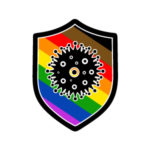
COVER STORY: Medical Asset
ICU float nurse Akil Jones plays an important role in nine intensive-care units.

As soon as news broke that the United States was likely to be impacted by the novel coronavirus (COVID-19), toilet paper, medical masks, and hand sanitizer flew off the shelves in stores around the country. While the public has been advised to stay indoors and away from others, nurses like Akil Jones, a proudly gay Houston healthcare worker, are dealing with this crisis head-on with bravery, tenacity, and hope.

A 2014 graduate of The University of Texas Health Science Center at Houston, Jones currently works as an ICU float nurse in the Texas Medical Center. “My job requires me to maintain a level of medical competence that will be an asset on any unit to which I’m assigned,” he explains. “My hospital has over nine different intensive-care units (ICUs) with different specialties, so I get to experience something new every day.”
Jones offers insight into what is being done at his hospital to contain COVID-19. “At my facility, they’ve been incredibly cautious about the spread of illness by catching symptoms and trends before they result in something dangerous,” he explains. “We’re normally briefed daily by our leadership about any changes regarding transmission, PPE (Personal Protective Equipment), treatments, and trends in the city that could affect the hospital.”
The medical professional acknowledges that his daily routine as a float nurse is always unpredictable by nature, but the pandemic has thrown even more uncertainty into his schedule. “I have worked a couple of shifts in our unit for Patients Under Investigation (PUIs) for COVID-19. These patients are separated from the general population while they are examined and tested,” Jones explains. “Some of the entrances to the hospital [have been closed], and we’re screening visitors, patients, and employees to ensure everyone is safe.”
“My job requires me to maintain a level of medical competence that will be an asset on any unit to which I’m assigned.”
Along with the disturbing lack of COVID-19 test kits, medical facilities have a dire need for safety equipment including face masks, gloves, and shoe covers—just to name a few of the shortages. “[The medical professionals here] have never had to deal with something of this magnitude before,” he explains. “I work in a facility that fortunately has the space and means to isolate these patients, but people that interact with these patients on a regular basis—nurses, respiratory therapists, nurse’s aides, environmental services—are still anxious, especially with the nationwide equipment shortage.”
With anxieties on the rise, Jones reassures us that these capeless superheroes understand their mission and responsibilities with this pandemic. “Even though people are anxious and scared, we all understand that we are part of something bigger, and are a major part of helping curb the rate of infection,” he says with confidence. “At the end of the day, we’re all working to help people heal. Working in healthcare comes with sacrifice, so no one is too shocked right now.”
Jones is quick to emphasize the role that every American must play to “flatten the curve” and keep friends, family, and neighbors safe. “Everyone should take simple steps to make sure they are not only protecting themselves, but protecting others,” he stresses. “People can be asymptomatic carriers, which means you would feel OK if you were to contract COVID-19.” Jones explains this is great news for you, but not if you were to pass it on to someone else. “Wash your hands for at least 20 seconds. Don’t touch your face, mouth, or eyes after touching anything. COVID-19 can live on materials for days. Practice social distancing.” Jones explains that minimizing interaction with others is crucial in helping flatten the curve of infection. And his advice for the extroverted and restless among us? “Work from home if possible, don’t go out unless it’s necessary, and don’t have house parties just because the bars are closed.”
Despite the complexities that each day brings with this global pandemic, Jones finds ways to invest in much-needed and well-deserved self care. “All of the information and fear can be overwhelming, so I try to do things that make me happy,” he says. “I’ve been watching a lot of cartoons, catching up on a little reading, and trying to do workouts from home. I think focusing on the pandemic nonstop can be just as detrimental to your mental health, so I think it’s important to find something that gives you a little relief.” Thinking ahead to the day when we return to a semblance of normalcy, Jones looks forward to life’s simple pleasures. “I can’t wait for the gym to open. I’m looking forward to traveling again and being able to go out for margaritas with my friends. Just simple things that I used to do without even thinking.”
Our nation, and our city, have pulled through tough times before by meeting the challenges head-on. By doing our part to flatten the infection curve by isolating ourselves from others, we are also helping healthcare professionals like Jones, who are on the front lines protecting all of us. With pressures mounting daily, Jones maintains hope by envisioning what we might learn from this experience as citizens of the world. “I truly believe that this crisis, like many others, will pass. People are following recommendations, and hospitals are working nonstop to ensure proper care for the general population,” he emphasizes. “I hope this whole experience can be a learning opportunity for everyone, from the federal level to the personal level. I hope it causes decision-makers to take a closer look at our healthcare system and deal with the issues and shortcomings that caused this infection to become a pandemic. I also hope it encourages individuals to take a more proactive approach in regard to their health.”
This article appears in the April 2020 edition of OutSmart magazine.










